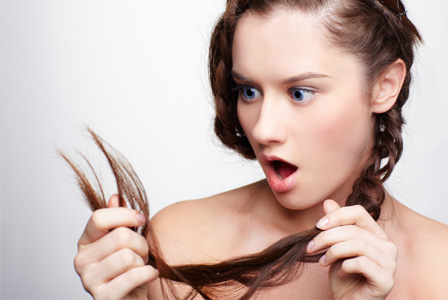
Having a full head of thick and shiny hair is the ultimate symbol of health. However achieving that look can take hard work and isn’t always possible if your hair is prone to splitting or breaking, or needs a lot of styling to look good. Not everyone can wake up every morning with the hair of a supermodel! So what if, for whatever reason, your hair needs special attention and a little extra TLC? Here are our top tips for caring for your hair if you’ve been overstyling it, or if you’ve suffered from health problems and you want your hair to return to full health just as quickly as you are:
Caring for Overly Heat-styled Hair
Blow dryers, curling irons and flat irons can all leave you with dry and brittle hair, and using your heat styling tools at too hot a temperature could even cause your hair to break off. Prevention is the best treatment for heat damage to your hair: ensure you use a heat styling spray that contains sillicon every time you heat style your hair to protect it and keep it looking healthy and glossy. However if the damage has already been done, then don’t worry, your hair can be repaired. Firstly minimize your use of heat styling tools: using these every day will only keep damaging your hair and won't give it time to repair itself. If your hair is damaged then visit your hairdresser and ask him to cut any split or broken ends: although this may leave your hair a little shorter than you would like, your hair will grow back thicker and healthier very quickly. Finally, apply a protein rich hair oil to your hair every week to keep your hair as glossy as possible.
Recovery from an Eating Disorder
Eating disorders are often fuelled by the aim of looking desirable: the signs of which, in modern society, are being slim, having glowing healthy skin and thick and healthy hair. However, anorexia and other eating disorders can cause hair loss and the lack of adequate nutrients in your diet will leave your hair looking thin, dull, and brittle. If you have received a diagnosis of having anorexia or bulimia, or even a dual diagnosis of eating disorder and addiction then the best way you can care for your hair is to begin your recovery process. Much like anorexia, drug and alcohol addiction can also lead to hair loss and lack of hair strength because addicts have a lack of sufficient nutrients in their body which stunts hair development. This kind of hair loss is caused by protein loss (having a lack of protein in your diet) so returning to a healthy weight, eating a varied and balanced diet, and reintroducing daily protein to your meal plans is the best thing you can do for your hair. You should also apply an intensive conditioning mask to your hair once a week: this will reintroduce moisture to the dry hair, and help smooth down any frizz resulting from breaks to the brittle hair. Finally, avoid coloring, perming or heat styling your hair until it has returned to full health as these processes will only further strip the nutrients from your hair, leaving it looking even more dry and unhealthy.
Recovery from Cancer
Having cancer is unlikely to affect your hair. However the treatments for cancer, such as chemotherapy and radiotherapy, can cause your hair to fall out in large clumps which is why cancer sufferers undergoing these treatments often choose to remove all of their hair before their treatment begins. As soon as you stop your treatment and begin your recovery you will see a soft fuzz to begin growing on your scalp within two to three weeks. Your hair will then grow and inch or two a month, and you will be back to having a full head of hair in no time! But how should you care for this newly emerging hair? It’s likely that your new hair will grow back frizzy or curly, so while it’s growing you should treat yourself to regular trims; this will encourage the hair to grow back thicker and healthier as well as giving your style shape and eliminating those pesky fuzzy ends! Again avoid and coloring, perming or other chemical treatments on your hair: as well as not being good for your newly emerging hair, these treatments could also react with the chemo drugs and leave your hair green! Not a good look! Finally, make use of a leave-in conditioner. This will provide a protective layer of moisture for dry hair, and you can use your usual styling products on top of it, leaving you with hair that looks full and healthy.
5 Easy Ways to Repair Damaged Hair
If you did not find the previous tips useful, you can check our next article.
It is about: Olive oil mask, hot oil treatment, thermal protection, nutrition boost for your hair.
Click here to proceed to the next article

